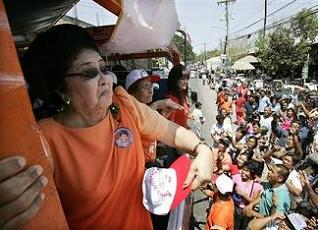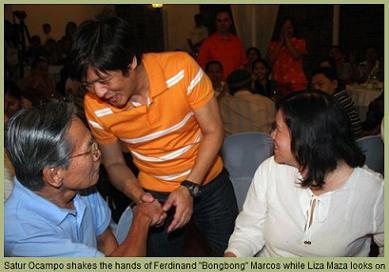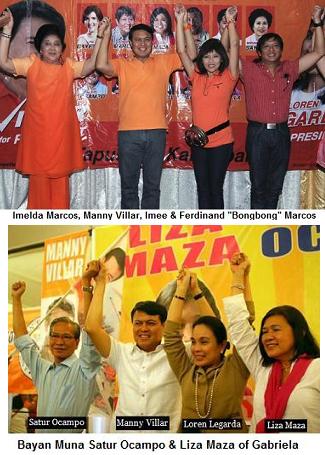PHILIPPINES: Marcoses come close to full circle
Alexander Martin Remollino | 31.05.2010 12:59 | History | Repression | Social Struggles | World



Forced into exile in Hawaii on the heels of the 1986 People Power uprising, the Marcoses were allowed to return in 1992.
This is not the first time since 1992 that any of the remaining Marcoses were able to hold elective offices.
Imelda was elected representative of her native Leyte's first district in 1995.
Bongbong represented Ilocos Norte, his father's home province, from 1992 to 1995. He subsequently served as Ilocos Norte's governor for three terms. In 2007 he was reelected as the province's second-district representative.
Imee was Ilocos Norte's second-district representative from 1998 to 2007.
This, however, is the first time all three of them are holding elective posts at the same time. While it is not quite yet the time for them to sing “Happy Days Are Here Again,” all it would take for a complete reversal of 1986 is for one of them to become president.
Bongbong, Imelda, and Imee are bent on restoring the glory days they enjoyed from 1965 – when Ferdinand Sr. was first elected president – to 1986, when protesters drove them out of the presidential palace in the wake of a fraud-ridden snap presidential election.
“I'm proud of what my father was able to accomplish,” Bongbong was quoted as saying in an item posted on his website.
“He was our best-ever president,” Imelda said of her husband. “During his time we had territorial integrity, freedom, justice and human rights. Whatever else people may say those were the best times ever for the Philippines.”
“The best roads and bridges were built during Martial Law,” Imee, referring to her father's imposition of martial law from 1972 until its paper lifting in 1981, in an interview on GMA 7's I-Witness in 2003. “Even the movies then were very good.”
What, exactly, are they aiming to restore?
The late Ferdinand Marcos Sr. won in the presidential elections of 1965. He won a second term in the hotly contested and highly controversial elections of 1969. Three years later, he placed the entire Philippines under martial law through Proclamation No. 1081, and lifted the proclamation – albeit only on paper – in 1981.
As historian-economist Ricco Alejandro M. Santos analyzes it, Martial Law was a response by Marcos's regime to socio-political trends that emerged in the time of his predecessor, Diosdado Macapagal. Santos wrote:
“Instructed by the IMF (International Monetary Fund), the elder Macapagal in 1961 instituted decontrol – the free inflow of imports through tariff reductions, and the free repatriation of dollar profits by foreign investors. This first policy measure of Macapagal set the Philippine economy into a tailspin, wiping out more than 10,000 businesses, and creating even greater poverty. Decontrol tightened the (neocolonization) of the economy, and whatever small gains were achieved in Filipino industrialization during the period of import and exchange controls.”
The conditions decontrol generated were filling up the streets with protesters – workers, peasants, students and intellectuals, and even sections of the business community.
Marcos assumed his first presidential term in 1965 amid a nascent political ferment. During his second term (starting 1969), nationalist dissent found its way into the corridors of the political establishment. Santos cites three major nationalist developments in the period from 1969 to 1972:
“In 1969, Congress under pressure from a growing anti-imperialist public opinion, passed a Magna Carta that call(ed) for national industrialization against the dictates of the IMF. Then from 1971 to 1972, nationalists were gaining ground in gathering support for an anti-imperialist agenda in the Constitutional Convention. In 1972, the Supreme Court (SC) issued two decisions unfavorable to foreign corporations: one, in the Quasha case, which nullified all sales of private lands to American citizens after 1945, and (an)other rolled back oil price hikes by the oil cartel.”
Ferdinand Sr.'s very first act after the issuance of Proclamation No. 1081 was a reversal of the Quasha case. A US Congress report would later admit that the Martial Law period was a time for the granting of greater privileges to foreign investment.
Based on data from military historian Alfred McCoy, there were a total of 35,000 political prisoners tortured during Martial Law. The torture methods ranged from electrocution of the genitals, “water cure,” and injection of mind-altering substances to threats of death to sexual molestation and even rape – of both women and men.
Data from Karapatan (Alliance for the Advancement of People's Rights) also show 759 persons as having involuntarily disappeared during Martial Law.
Likewise, data from various human rights groups place the number of victims of extrajudicial killings under Marcos's rule at 1,500.
It is not only on human rights that the Marcos regime wrought havoc. The Philippine economy was also a victim of its abuses.
“The public sector was controlled by placing trusted technocrats in key government positions,” wrote scholar Ricardo Manapat in his book Some Are Smarter Than Others: The History of Marcos's Crony Capitalism. "Cabinet ministers followed Marcos and Imelda's wishes unquestioningly. Government projects were implemented not because they provided public services but because they were sources of kickbacks. The private sector of the economy was sliced into different spheres of influence. Each partition was handled by a relative, a close friend, or a trusted crony. Each company, every industry, all sectors of the economy, provided that they were sources of money, became the object of greed and eventual acquisition. The whole economy came to be divided into different fiefs managed by relatives and cronies who regularly shared their earnings with the dictator."
For instance, Antonio Floirendo Sr. wrested control of the banana industry, Eduardo “Danding” Cojuangco controlled the coconut industry, and the sugar industry became Roberto Benedicto's territory.
Ferdinand Sr., according to a 1984 study of the Philippine economy, issued at least 688 presidential decrees and 283 presidential letters of instruction granting himself and his cronies “exclusive rights to import, export or exploit certain areas, the collection of large funds which are then privately controlled and expropriated, and the preferential treatment of certain firms for purposes of credit or credit restructuring.”
His main economic accomplishment, as noted in an article in the July 21, 1891 issue of Fortune, was “to help his friends and relatives build giant conglomerates.”
The country, while not yet at the indebtedness level of many African countries, is nonetheless heavily debt-ridden – in no small part because of the Marcos regime. The Philippines' foreign debt was less than USD1 billion when Ferdinand Sr. became president. It had gone up to USD28 billion by the time they were booted out. Filipinos continue to pay for these debts, together with several newer ones, through the late dictator's Presidential Decree No. 1177 – providing for automatic budgetary appropriations for debt servicing – which the late president Corazon Cojuangco-Aquino's Executive Order No. 292 later affirmed.
Aside from these, Ferdinand Sr. also went down in history for having drained the country's coffers. The Presidential Commission on Good Government estimated the stolen Marcos money at USD5 billion to USD10 billion. Former Solicitor-General Frank Chavez said it comes up to as much as USD13.4 million in Swiss banks.
If any of the three – Imelda, Imee or Bongbong – later takes a shot at the presidency and succeeds, it would be full circle for them – a total reversal of 1986.
Alexander Martin Remollino